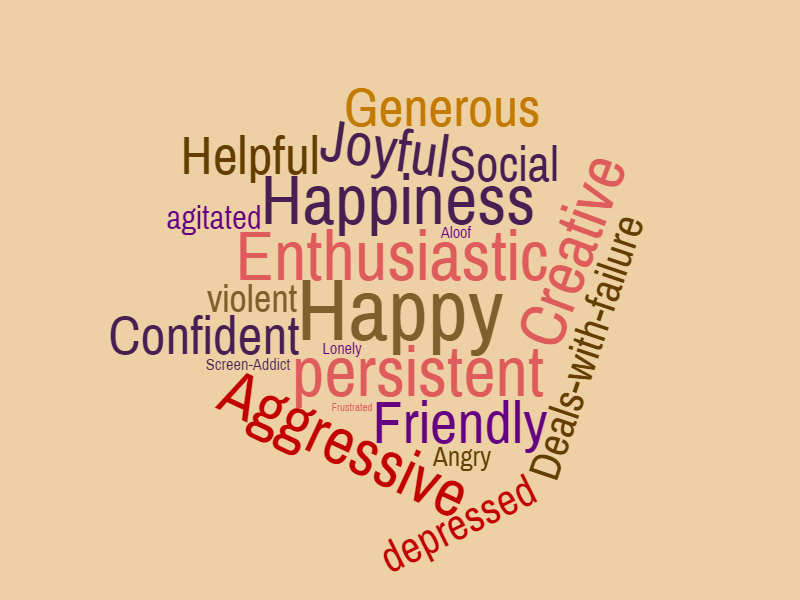It seems very strange when I say that parents themselves could be killing their child’s happiness. It is a bitter pill I am giving out like the doctor who says virals and fevers and colds are good for your child’s immunity. I want to know are you compromising the mental and emotional immunity of your kid?
There are lot of fads which have come up as far as parenting is concerned and many of them are highly counter-productive to kids developing attitudes of happiness. And the attitudes the child imbibes are a very reliable predictor of happiness later in life.

The latest research says that happiness can be learnt, the brain can be trained to experience happiness, the opposite of this also true unhappiness can also be learnt and brain can develop attitudes which will elude happiness experience. Are parents without knowing giving their kids SKILLS OF UNHAPPINESS?
The “ focus of every parent should be to prepare the child for life and not to protect the child from life”.
Inadvertently and a lot of times driven by guilt we may be taking away the right of the child to be happy in these 3 ways.
1. Easy and too frequent a use of reinforcing that you are special – It is considered very desirable these days to keep telling your child that you are so special, so great; all the time. While it may be a good idea to boost up the child’s self-esteem by such affirmations too much of it can spell disaster. More so when this affirmations are not connected to any kind of positive effort or achievement.
I will tell you what happens, Let us say there is this really sweet child (Just like every other child) called Rahul and he is lucky to have parents who are very well educated, liberal, loving and well earning. And they really believe in telling Rahul that he is great, he is so special, and he is the best morning evening, afternoon! He can get anything in life, be anything he likes; all good for self-esteem and confidence. So what is the problem? There are 3 major problems with it.
• It is myth which has got created that just telling a child he is great in isolation can be very positive, it’s not true. We are telling Rahul he is special and great but we are forgetting to tell him that all other kids are special and great too. We are telling him inadvertently that he is special without any effort from his side. We are not linking the special status to any of his efforts. And this is a huge disservice we are doing to Rahul as we are taking away his ability to be something on his own, appreciate and accept others, to earn the feeling of satisfaction he can have by dealing with the challenge of how to actually be special and great.
• Secondly, we are telling Rahul he is special and great so easily that he is beginning to expect this from rest of the world too. The rest of the world will not take the same view. We forgot to tell him that while all kids are special for the parents, in the real world outside the four walls of his home not everybody will find him special and it’s OK. World will treat you as special only after proven yourself to be so. We are raising his expectations to an impossible level without giving him the necessary tools to reach a point where his expectations are likely to be fulfilled. Rahul doesn’t know the how to of it all. A potent recipe for frustration.
• Similarly we are also not telling Rahul that while he can be anything he wants, he has infinite possibilities; which is true; but it will require hard work and it will take time. Basically it is like telling Rahul that he is a great driver, the best, without teaching him driving at all. It is extremely important to link effort and achievement. You can never have anything worthwhile without working for it. So once again Rahul fails to learn the virtues of hard work and persistence, so essential to keep happiness flowing in your life. Hard work in itself is a source of great joy and happiness. It is proven that a sense of achievement is linked to happiness. A struggle and getting something through effort also makes it easier to experience happiness generating emotions like gratefulness, compassion and empathy.
Now lets us take a look at what this attitude does to Rahul’s interactions with the real world. He believes he is special but finds others do not share this view. Conflict and frustration develops in his mind but sadly he has no real skills like accepting others, being non-judgemental, patience, resilience to deal with it.
He doesn’t know what to do to be special and his expectations make him feel let down often. His relationships with friends, teachers begins to revolve around how special they tell him he is. If that does not happen as it is not likely to, he begins to avoid much interaction as it causes him to feel not so good. These scenarios further reduce Rahul’s coping skills and start denting his self-esteem. He can’t understand the anomaly between the special status at home and not so special outside. So Rahul becomes a lonely child simply trying to cope through avoidance. Again very detrimental to long term happiness.
2. Presenting a role model of Screen Addiction: It has become an epidemic called Screen addiction. Most of time parents are hooked on to one screen or the other. So at a very early age Rahul starts dabbling with screens. Parents are happy, he is busy with himself. Rahul sees with interest that his parents constantly look at their phones even when they are talking to him and others, or having dinner, or driving, watching a movie and so on. What does Rahul learn? That mobile phone is the most important thing, PERIOD. More important than any other person too and its acceptable to use it to the point of rudeness.
So our Rahul begins to explore it and finds phone very addictive. Why? For two reasons one: it does as Rahul wants and since he already has little tolerance for things not going his way mobile is a great companion. Two: mobile is a source of instant gratification, everything is right here right now and this gives him a kick a sense of power and capability. He can do whatever he wants, immediately. What does this do to his happiness attitudes? It kills them forever. So social interaction skills, sensitivity to others, politeness and patience goes out of the window. All of whom are important indicators of happiness in later life. Please Please keep the screen out of sight and out of mind at least for an hour of quality time with Rahul. You will see the difference within two weeks.
3. Not letting Rahul Learn Failure: Rahul has amazing parents who believe it is so important to make Rahul feel he can never fail. So if he doesn’t do well in studies or music or craft, just anything they cover up for him. They do his craft, his homework, his assignment you name it. They also do it because getting applauds through their child gives them a huge kick.We have begun to believe that failure is bad to the extent that we don’t utter the word failure as if it doesn’t exist.
In fact the reverse is true, failure is real,Failure is good, failure is a must. Learning to fail is one of the greatest gifts we can give to our Rahul. The earlier we develop his failure coping mechanism the happier he will be in life.
Working hard and embracing failure despite effort is one of the happiest attitudes to develop. It builds mental and emotional muscle and immunity. Failure as learning and growing opportunity is the number one predictor of happiness and success later in life.
This is especially true for kids of affluent classes who have lesser failure opportunities naturally in their environment. Create opportunities of failure. Learning to fail at events/activities will make sure they don’t fail in life. I believe strongly that if we teach our kids Art of failure, we can say goodbye to depression and aggression forever. Ability to handle NO is the key.
So sit back take a long hard look at what you are doing and jot down the dark areas and start working on them. As I said in the beginning Prepare Rahul for LIFE!!
Recommended for you
Please share and comment.










